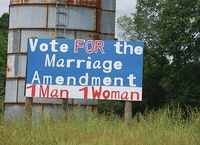Wednesday, May 09, 2012
On Tuesday voters in North Carolina voted in huge numbers to
ban same-sex marriage. And yet, 60 percent don't fully understand what
the legislation they voted on actually does.
Amendment One changes the state constitution "to provide that marriage between one man and one woman is the only domestic legal union that shall be valid or recognized in this state."
In practice, that means not only a ban on same-sex marriage, which North Carolina already has in place, but a ban on any form of civil union for same-sex couples.
However, a recent survey from Public Policy Polling finds that only 40 percent of voters in the state interpret the law correctly.
Asked what a "yes" vote on Amendment One means,
- 27 percent said it meant a ban on gay marriage alone.
- 26 percent of respondents said they were not sure what the legislation did.
- 7 percent got it totally backwards, saying they thought a "yes" vote would legalize gay marriage.
Altogether, that's 60 percent of voters in the state who don't understand Amendment One.
"That's not a huge surprise," says Annetta Cheek, Chair of the Center for Plain Language, a non-profit that works to make government communicate more clearly with citizens. "I'm actually surprised 40 percent might have understood it."
Cheek said the vast majority of legislation goes misunderstood by the voting public. "Frankly, every time I have to vote on something locally, it's very hard to understand what I'm voting on."
Why is the North Carolina law so confusing? For starters, North Carolinians are sort of voting on a double negative here:
A "yes" on the legislation means a "no" for same-sex unions. (One can understand why 7 percent of voters may have thought a "yes" vote meant "yes" for same-sex unions.)
Another source of confusion could be that the amendment never mentions "same-sex" couples or "civil unions" specifically; these are the terms in which people normally talk about gay marriage. Instead, the legislation reads:
Marriage between one man and one woman is the only domestic legal union that shall be valid or recognized in this State. This section does not prohibit a private party from entering into contracts with another private party; nor does this section prohibit courts from adjudicating the rights of private parties pursuant to such contracts.
Whew. Still with us?
Annetta Cheek points to the second sentence as a source of major confusion. "The first sentence uses 'union' and the next sentence uses 'contract,'" Cheek said. "The authors meant them to be the same kind of legal arrangement. But by using two different words, they lead many readers to wonder whether they mean two different sorts of things entirely."
Bringing up undefined contracts in the middle a bill about same-sex unions, even if they're supposed to mean the same or similar things, adds unnecessary complexity to what should be a simple statement banning certain behavior.
"They would have been far better off to put this in a separate section," Cheek said. "That way people would not be as inclined to read it as a modification of the original statement — although it would still likely cause some confusion because it uses typical legalistic language and jargon."
The confusion in North Carolina may have had a major impact on the fate of the legislation.
Public Policy Polling found that before Tuesday's vote, 55 percent of North Carolinians planned to vote "yes" on Amendment One, while 41 percent would vote "no." That's 55 percent voting against gay marriage or civil unions.
But PPP also found that 55 percent of voters "support some form of legal recognition for gay couples in the form of either marriage or civil unions." In theory, that means the first numbers should be reversed: 55 percent should have planned to vote "no" on Amendment One — and for some form of civil unions — not the other way around.
But that's not what happened. On Tuesday, Amendment One passed with 61 percent of the vote.

No comments:
Post a Comment